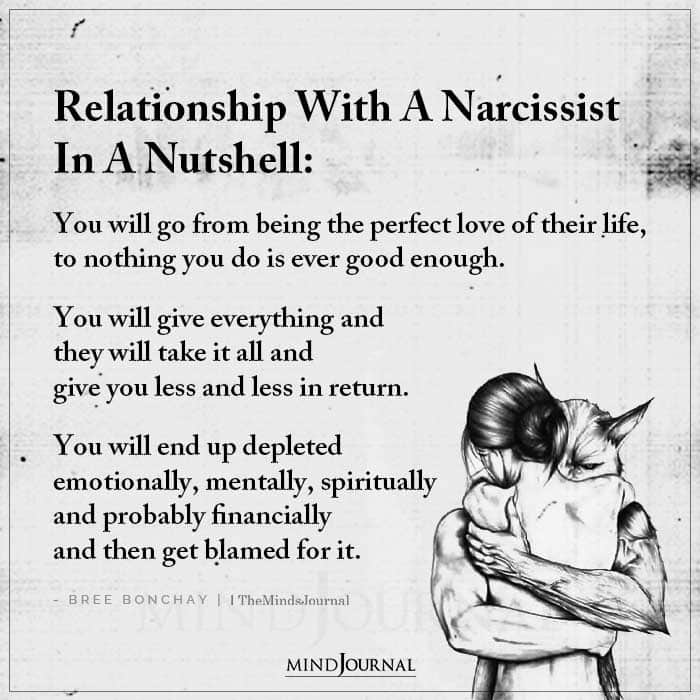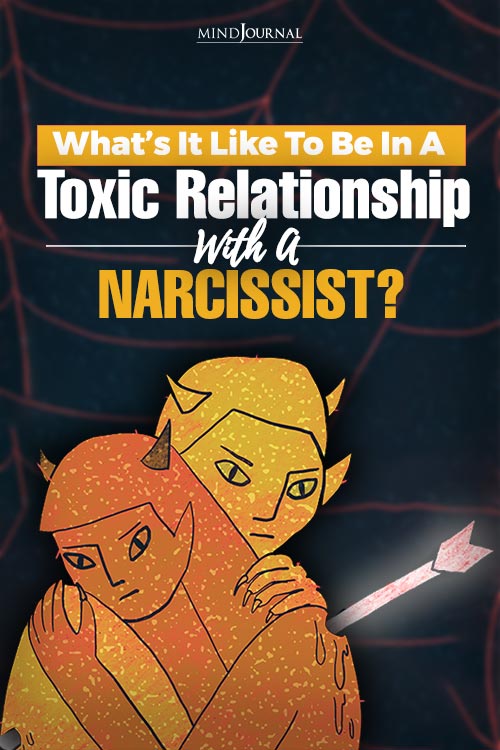Ever felt trapped in a relationship with a narcissist where you constantly question your worth? It might be abuse at play. Let’s navigate this together.
A narcissist’s coping mechanism is only abusing. It’s what they do. You will feel worthless, doubt yourself, and will constantly feel guilty. That’s what narcissistic abuse will make you feel.
You’ll continually be walking on eggshells and no matter what you do, it will never be enough. The obvious decision and the best thing you can do for yourself is to break away from the narcissist. But, we know, sometimes reality is not as simple as it is to write about it.
Do you know how it feels to be in a toxic relationship with a narcissist? Have you experienced narcissistic abuse? And can you recall the first time you really started to realize that something wasn’t right?
It’s this ache in your gut, that one stray tear you can’t control and as it rolls down your face, it almost burns. It’s like your body gets it before you do, somehow.
It’s this feeling that something is missing or isn’t right. So, you try to figure it out. So, you start thinking and you go through all of the obvious possibilities.
Am I hormonal?
Am I being unreasonable?
Are my expectations just too high?
Could I be overthinking this whole thing?
As much as you rack your brain, you aren’t clear. You just know that it is something else. Something you can’t quite put your finger on….like a piece of you feels like it’s missing or gone somehow.
But how do you lose a whole part of yourself? You might kind of laugh at yourself, but the thought makes you feel almost nostalgic … but in an unidentifiable, achy way that can’t be logically explained.
Maybe you have this sense that it might be some kind of other life calling to you. You think maybe it’s on the soul level.
Being In A Relationship With A Narcissist

1. Narcissistic Abuse Causes You to Lose Yourself
You start to feel like you’re living inside your own head. You’re so internal that you might even start to hate everyone and everything. You start to see through it all, and everyone seems artificial. Their lives seem small and petty.
Their problems seem unreal somehow – they are so far away. They are blind to your struggles and you can’t even begin to verbalize them, because they sound so petty when you say them out loud.
But you do your best to keep looking perfect on the outside and you pretend like nothing is wrong. You keep smiling and pretending that all is well.
2. Perfect on the Outside, Broken on the Inside
You maintain a perfect social media presence, photos of your beautiful home, and successful kids. You feel like a huge fraud as you try to project the image you want to see in your life, rather than what it really looks like behind closed doors.
It’s like social media gives you a certain amount of validation that you can’t get elsewhere. It makes you feel better somehow like it’s okay that you’re dealing with all of this internal conflict because you project that perfect life image.
Meanwhile, the narcissist in your life is always threatening to leave you. Threatening to stop loving you if you don’t conform to their will.
They threaten to stop caring about anything if you don’t shape up. We will just live our separate lives, they tell you. See how you like that, they say.
Read: What a Relationship with a Narcissist Actually Feels Like
Apathy, Brain Fog and Cognitive Dissonance in Narcissistic Relationship
It’s like you’re living in some kind of bubble and nothing feels real. You’re not even sure YOU are real. You’re exhausted and pretty much numb at this point.
But every now and then, something reminds you of who you used to be, the fun and silly and passionately driven person that the narcissist seems to have beaten of you (emotionally anyway).
And when that happens, that person who you used to be…that person gets sad. Then you feel angry and like you’re finally ready to go. But inevitably the scary thought that is change takes you down this stupid road that imagines that things can be better.
The one part of you that is afraid to jump without a net shows up again and tells me that you’re overreacting and that it’s not really as bad as you think.
That’s the problem with the narcissist’s intermittent reinforcement style of love because right about the time you think maybe it really is going to be different …bam! Smacked in the face with more manipulation and mind games again.
You remember that the definition of insanity is to continually repeat the same cycles and behaviors while expecting different results. And yet, here you are. You’re tired of being in this relationship and tired of feeling consumed with trying to make it okay when you are clearly less important than literally anyone or anything else in the narcissist’s life.
Your cognitive dissonance is strong now. You always thought this relationship was supposed to be us against the world. Me and you, you and me. Ride or die. Unconditional acceptance of one another. You keep offering it up, but you inevitably get the opposite in return.
What is Cognitive Dissonance?
Cognitive dissonance is a form of psychological stress or discomfort that happens when you simultaneously hold two or more contradictory beliefs, ideas, or values.
Read: What Is Cognitive Dissonance? Common Causes and How To Resolve It
Narcissistic Relationships Are One-Sided and Conditional
Your relationship with an abusive narcissist will always be conditional and one-sided. You’re tired of never being enough.
You’ve had enough of not being enough by now. You always say you’d rather be alone than unhappy … but the idea of losing everything you’ve worked so hard to build scares you more than the idea of shutting your mouth and pretending so that your kids can have a good life.
But you keep asking yourself this crazy question: am I really willing to give up the next umpteen years of my life being miserable? Isn’t it possible that I can have it both ways?
And yet, as you sit in the cold, numb aftermath of yet another attack on your personal character, your thoughts are dulled and foggy. You can’t seem to form a complete thought as the narcissist’s sharp, cutting insults replay over and over again in your head.
This torturous soundtrack is accompanied by a small voice in the back of your head, the part of you that remains indignant about the abuse, the slowly-dying part of that still knows it’s not normal and remembers that you deserve better.
That part of you quietly counters the insults, reminds you that they’re all a part of the manipulation tactics the narcissist uses to gain control.
That’s the same part of you that truly knows that you’re not in a “healthy” relationship and that there’s little chance you’ll successfully change this person. That part of your mind races, struggling to form a plan to fix things, to make your escape, or to at least find “normal” again.
And it’s that part that will ultimately help you to not just exist and survive, but also to really thrive and become the fully realized person you deserve to be. The longer you remain in a toxic relationship, the more you deny your truths in order to avoid the wrath of this narcissist, the quieter this voice becomes.
Denying Your Feelings as a Result of Narcissistic Abuse
When you deny your feelings when you allow yourself to be told that you’re not a real person and that you don’t matter – you begin to act as if that is true.
You start to breathe and believe it – you emanate a vibrational sense of “I’m not good enough.” And you become inferior because you believe that you’re inferior.
It’s hard to be happy when someone is always criticizing everything you say and do. It feels like you’re always walking on eggshells.
And when you start to actually enjoy a conversation, whether it’s with them or with someone else, they cut you off because they aren’t interested in anything you have to say or they interrupt because whoever you’re talking to is not paying attention to them…well…it’s emotionally crippling, to say the least.
Only a person with extremely high self-esteem could even survive it, you think, let alone remain capable of thinking they have value in the world. You need someone to talk to, but you don’t know who will get it. You’re living in a constant state of invalidation. But why?
Because, at some point, during our toxic relationships and often beginning in childhood, people like you and me? We learn that love must be earned. We learn that our value and worth are conditional at best – and that’s if we think we have any at all. People hurt us and our souls are crushed. Our selves are lost.
Narcissistic Abuse Makes You Feel Unlovable and Worthless
We forget who we are, or maybe we never knew. We learn that people don’t love unconditionally, or that if they do, no one has found us worthy of such love. So what do we do? How do we deal?
We tiptoe around and we accept the crumbs – that intermittent reinforcement thing again- the crumbs of kindness and affection that have been our sustenance for our whole lives.
We take those crumbs and we are grateful for them because we don’t even think we deserve this much, and we can’t imagine what it must feel like to be one of those people who have people who actually love them.
We pretend to be happy, Our faces smile, but not our eyes.
Most people don’t notice, and those who do make us feel attacked. They say they’re concerned about us, they note that we’re different than we were before.
And often, their concern is genuine. But whether we aren’t ready to hear it yet or we’re concerned that they’ll upset the abuser in our lives, we push them away and we hope they will just leave us alone.
Because one more conflict with the narcissist will kill us, we think. And this person, as much as we love them, just doesn’t really get what we’re dealing with when it comes to our relationship with the narcissist.
Read: What Is Emotional Abuse? 10 Signs You’re Being Emotionally Abused
Why Narcissistic Abuse Makes You Walk on Eggshells and What That Means for You
We learn to walk on eggshells, and we may or may not cognitively realize that underneath it all, we’re such nice people because we are secretly afraid that the narcissist will leave us, like everyone else does and has, in one way or another.
We get scared that everyone will leave us or otherwise abandon us. So we start being too nice to everyone around us.
We stop talking about ourselves because people don’t seem interested and because our emotions seem to be a burden for anyone with whom we’ve shared them. We allow people to abuse us and we beg them to stay.
We accept it because we secretly fear that they have been right all along and that we truly are in fact unlovable.
Why You Have to Keep Starting Over in Narcissistic Abuse Recovery
Every now and then, we think we’re going to change ourselves. And we want to change our lives. We promise to ourselves that we’re finally going to start taking care of ourselves for once. We swear that we’re going to finally come into our own power and we’re going to start enforcing our boundaries – maybe for the first time ever in our lives.
We think it’s time to follow our passion and to actually start truly LIVING our lives. And sometimes, we succeed – we actually make things happen. Sometimes, we even manage to leave! Changes begin to become more and more apparent, and we think, “This is it! I’ve figured it all out!”
We are finally happy. We’re on top of the world! Other times, we fail. We forget to try, or we feel too exhausted at the end of the day. Or, we just…can’t.
But let me tell you something. Sometimes, it takes more than one shot. Sometimes, you have to keep starting again, and again. Sometimes, we have to learn new ways to think – and we have to do it again and again. We have to relearn all of it each time we forget. We have to remember who we are and what we’re doing here.
The narcissist always does their best to make us forget, to shape and mold us into the extension of themselves they both want and simultaneously hate and resent. And yet, that little voice inside of ourselves keeps telling us that something isn’t right. That we need and in fact deserve better.
And you know what? That little voice, your intuition, is right. And it reminds you that the truth is that we only really fail when we stop starting. No matter where you are n your journey, and no matter how good it really gets, you still might, on occasion, have to start again. And that’s okay. You’re totally normal. Just keep starting.
Don’t give up on yourself, and keep tuning in to that little voice, your gut – whatever you call it, tune into it and listen carefully. It is the part of you that knows the truth, and it’s the part of you that’s going to get you out of this whole thing and help you to take your life where you need it to go. You with me?
Read: Recovery From Abusive Relationships: How Long Does It Take?
Question of the Day
Can you relate to dealing with narcissistic abuse in a toxic relationship? Share your thoughts, ideas, and experiences in the comments section below.
Written By:ANGIE ATKINSON Originally Appeared On: Queenbeeing.com Republished with permission.












Leave a Reply